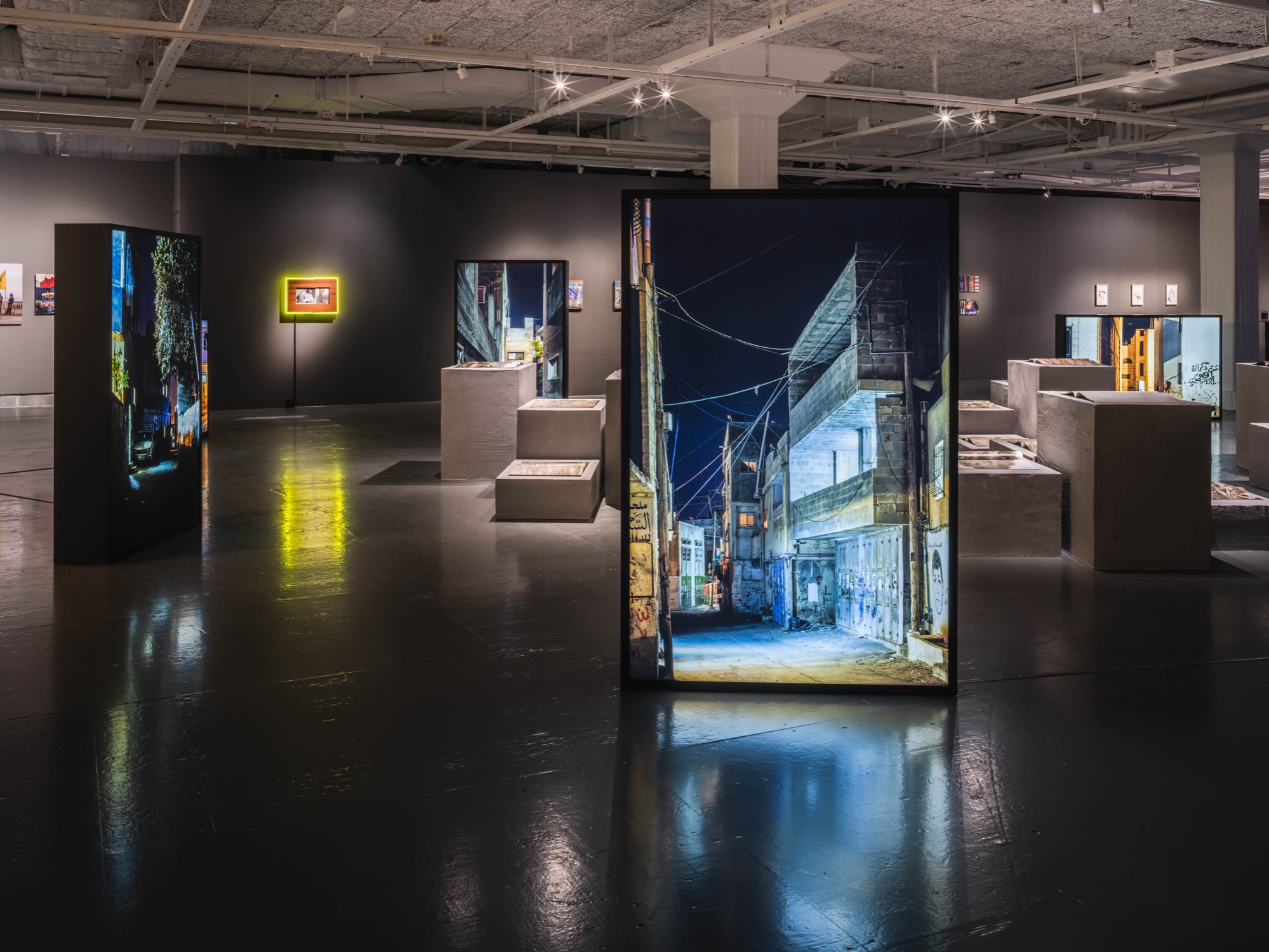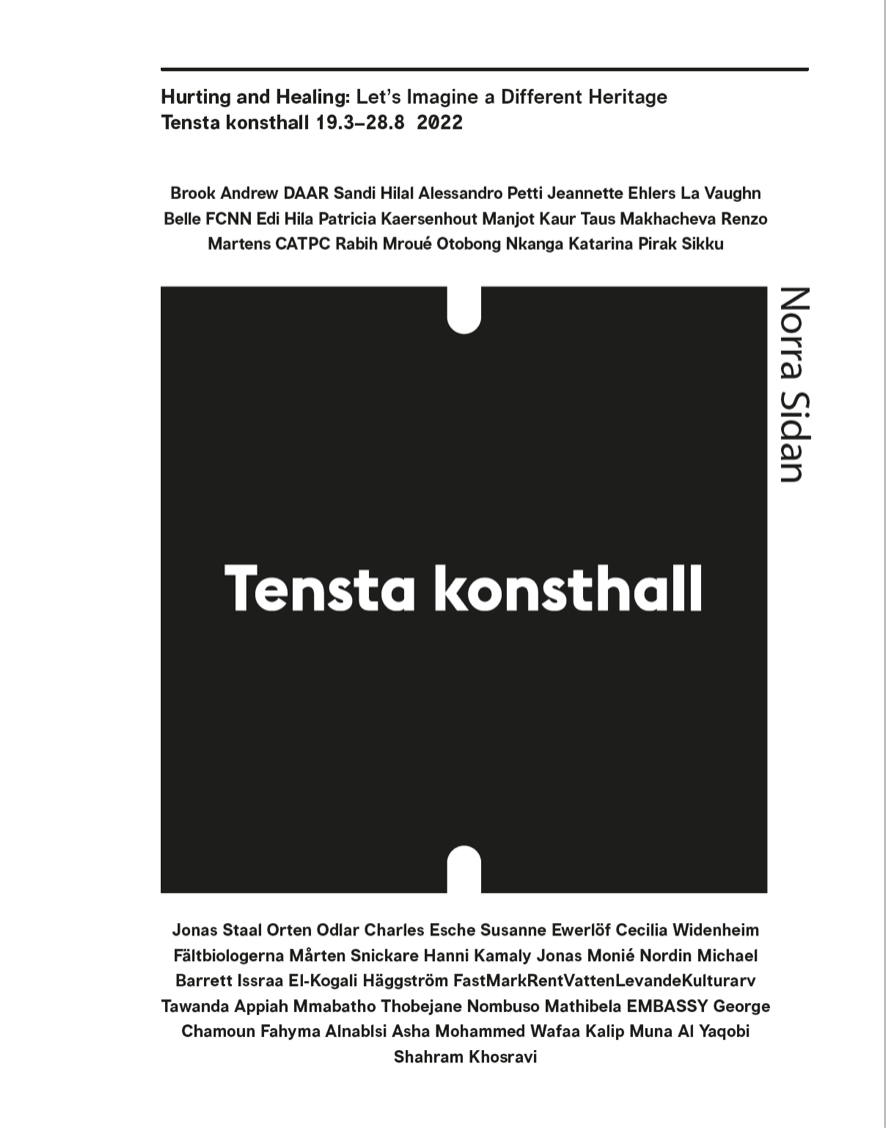This exhibition at Tensta konsthall poses the following question: How can the understanding of cultural heritage be decolonized by societies and organizations shaped by European knowledge systems? In this project, Charles Esche, director of the Van Abbemuseum and Tensta konsthall engage in dialogue with a number of artworks, artists, researchers and guest curators with the purpose of looking closer at how western-centric perception of cultural heritage can be challenged and redefined.
The exhibition has its origins in Palestine and in a close working relationship between Esche and the artists/architects Sandi Hilal and Alessandro Petti. In their Refugee Heritage, they speculate on what would happen if the Dheisheh refugee camp in Palestine was designated a UNESCO World Heritage Site, and afforded the same status as, say, the Pyramids of Giza, Birka or the Taj Mahal. The installation, which consists of light boxes and photo albums, makes reference to the camp and its relations with the Palestinan villages from which people were driven out in 1948. Dheisheh, created in 1949, can be understood as a permanently temporary society within a stateless nation, existing both in adherence and in contradiction to the UN regulations.
By proposing it as something to preserve and nurture, the conditions for how a world heritage site can emerge are shifted for a moment. Can exile take us towards a different understanding of the need for a nation state? What should be preserved once the occupation of Palestine is a historical memory? From this central question, the exhibition contains a series of works that each present concrete proposals for how new cultural heritage can be imagined, or shift, twist and turn existing perceptions of how the past works in our time and in the future. Several works address the historical colonial exploitation, inequality and devastation caused by global capitalism. As for example Jonas Staal's documentary images from Rojava, images that depict the process to establish democratic confederalism in the Kurdish area of North Syria, and Taus Makhacheva's balancing act, in which museum paintings are moved between mountaintops in the Caucasus Mountains by a tight-rope walker, and an installation by Otobong Nkanga addressing the subject of land exploitation in Brazil, Namibia and locally.
Also in the exhibition is Renzo Martens & CATPC's portrayal of a conflict over cultural heritage between a group of artists from the Democratic Republic of Congo and an American museum. The exhibition will also present works by Katarina Pirak Sikku, FCNN, Jeannette Ehlers & La Vaughn Belle, and others, all of which relate to Scandinavia's colonial past and future. Many of the works belong to the Van Abbemuseum in Eindhoven, which has processed its colonial history together with artists in a number of exhibitions, seminars and publications over the last few years.
In conjunction with the exhibition, an extensive programme will be presented in dialogue with art historian Mårten Snickare, who teaches postcolonial studies at the Stockholm University, and who researched the colonial trophies of the days of the Swedish Empire, and speculated on the potential futures of those specific museum objects. The programme series ”En annan blick på…” ["Another look at…"] consists of a sequence of visits to places and collections, with the overall purpose of sparking discussions on how our notions of cultural heritage have shifted over the centuries, as colonialism, post- and neo-colonialism have brought us to where we are today. Two events are organized in collaboration with curators Tawanda Appiah and Mmabatho Thobejane, which will deal with how sound has been perceived and used as cultural heritage by Black groups all over the world. In their work, they place the discussion on cultural heritage around the immaterial, beyond nation-building, and try sound as a place for affect, memory, pulse, solidarity and spirituality across space and time.
They depart from, and expand on, Black sonic traditions to explore how these are lived and experienced in a Swedish context, and how they overlap with traditions from the African continent and broader diaspora. The two events encompass performances, deep listening sessions, and (re)interpretations of musical archives, engage various artists and are organised in collaboration with Lyssningsrummet at the Royal Institute of Art. During the spring, an anti-racist book club for young adults, which will be focused on the study of Frantz Fanon's classic The Wretched of the Earth (1961), a treatise on racism, power structures and colonialism. The group will meet for four Tuesday evening sessions, to discuss the current situation and their own experiences in relation to the history of racism, and the ideas that have made Fanon one of the most important thinkers of our time. All participants receive a complimentary copy of the book. The book club will be led by Shahram Khosravi, Professor of social anthropology at the Stockholm University, and is produced in collaboration with Tensta Library. Participating artists: Brook Andrew, DAAR (Decolonizing Architecture Art Research) Sandi Hilal & Alessandro Petti, Jeannette Ehlers & La Vaughn Belle, FCNN (Feminist Collective with No Name), Edi Hila, Patricia Kaersenhout, Manjot Kaur, Taus Makhacheva, Rabih Mroué, Renzo Martens & CATPC (Cercle d’Art des Travailleurs de Plantation Congolaise), Otobong Nkanga, Katarina Pirak Sikku and Jonas Staal. The exhibition is produced in collaboration with the Van Abbemuseum in Eindhoven and the programme is carried out together with The Royal Institute of Art, Mårten Snickare / Accelerator and Tensta Library with the support of the Mondriaan Fund and the Delegation of Flanders / Embassy of Belgium.
Hurting and Healing: Let's Imagine a Different Heritage
19.3—28.8 2022
Participating artists: Brook Andrew, DAAR (Decolonizing Architecture Art Research) Sandi Hilal & Alessandro Petti, Jeannette Ehlers & La Vaughn Belle, FCNN (Feminist Collective with No Name), Edi Hila, Patricia Kaersenhout, Manjot Kaur, Taus Makhacheva, Rabih Mroué, Renzo Martens & CATPC (Cercle d’Art des Travailleurs de Plantation Congolaise), Otobong Nkanga, Katarina Pirak Sikku and Jonas Staal. The exhibition is produced in collaboration with the Van Abbemuseum in Eindhoven and the programme is carried out together with The Royal Institute of Art, Mårten Snickare / Accelerator and Tensta Library with the support of the Mondriaan Fund and the Delegation of Flanders / Embassy of Belgium.
Read more ↓
Read more ↓
On until
28.8 2022Opens
19.3 2022
28.8 2022Opens
19.3 2022
Exhibition is open
Tuesday—Friday 11—17
Saturday and Sunday 12—17
Closed 24 December—1 January
Free entrance
Tuesday—Friday 11—17
Saturday and Sunday 12—17
Closed 24 December—1 January
Free entrance




